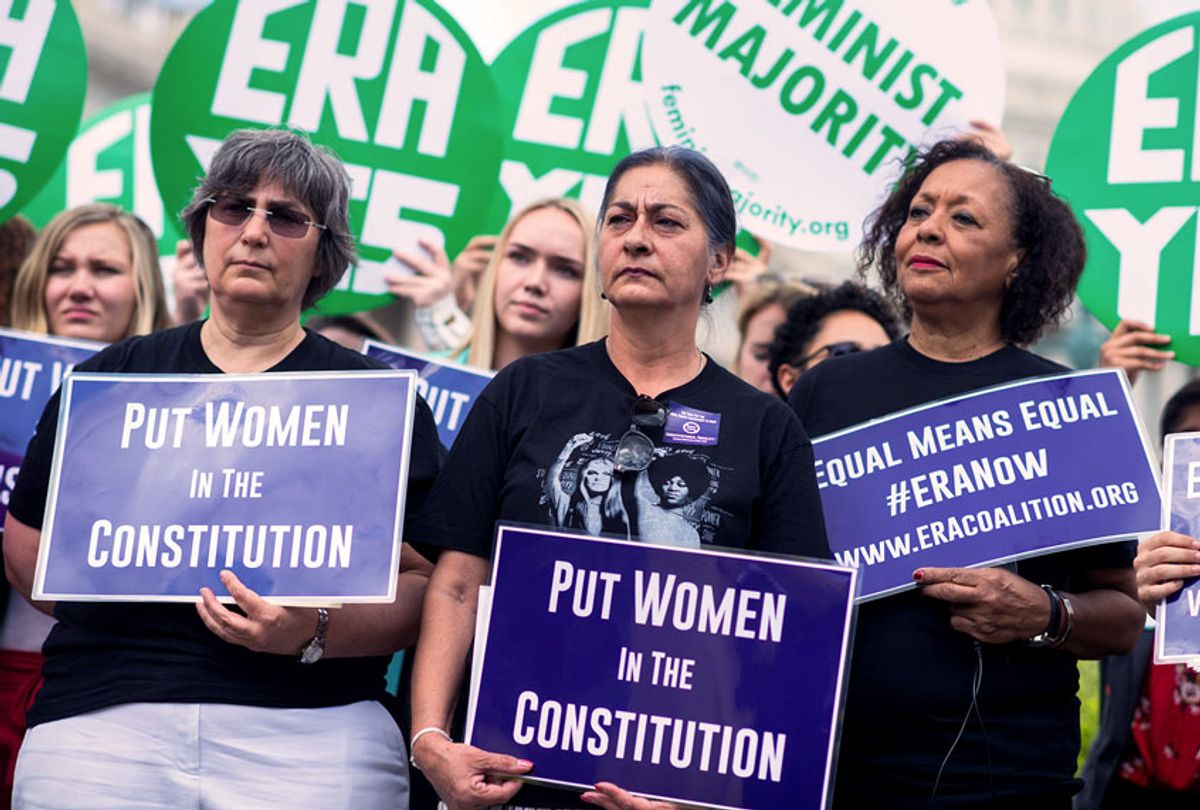In an interview with MeidasTouch on Thursday the host Ben Meiselas asked President Joe Biden what he is working on right now and what he hopes to accomplish before the end of his term. President Biden responded, “There's a couple things I want to get done. Women's issues, for example... We should be passing the ERA. There's a consensus for it.”
This is a good sign. The Equal Rights Amendment (ERA) has been over 100 years in the making, and it is long overdue. To borrow a phrase from the suffrage movement when the ERA was first written—we want deeds, not words.
The ERA has met all the requirements to be added to the Constitution. All that’s left is one signature.
The ERA is a fundamental fix to gender-based discrimination 100 years in the making. Once finalized, it would enshrine gender equity into our nation’s Constitution as the 28th Amendment, protecting women from violence no matter who’s in the White House. It would make it easier for women to win in court and provide an avenue for Congress to pass more robust laws to protect us.
In recent years, our rights have experienced a whiplash roller coaster. After Donald Trump was first elected president in 2016, women got organized. We got angry. Our unapologetic outrage sparked many movements for justice, including a resurgence of #MeToo. This hashtag and the women who used it to share their deeply personal stories had an enormous cultural impact. Yet, meaningful policy change did not follow. Even after laying bare their traumas, survivors were left with little recourse. And, despite all of this, men accused of assault keep rising to positions of power and authority. The ERA could be #MeToo’s ultimate vindication.
We need your help to stay independent
This is not hyperbole. The ERA is the groundwork for gender equity in this country. It could help strengthen laws like the Violence Against Women Act (VAWA) which, in its initial 1994 iteration, provided a way for survivors to sue their attackers in civil court. Legislators at the time referred to this civil rights remedy as one of VAWA’s most important provisions. Unfortunately, in the year 2000 the Supreme Court decided women do not have a constitutional right to be free from gender-based violence and therefore Congress had no foothold to pass that provision of VAWA. With the heart of the law cut out, women have been left fewer protections.
Adding the ERA to the Constitution would change that. It would grant Congress a new, stronger authority to pass laws addressing gender-based violence. With it, they could return VAWA to its most powerful form, giving survivors a way to sue the people who violated them—an especially important recourse when the criminal system fails to deliver justice. This provision would help empower survivors and would deter abusers from continuing to assault women. Without a specific equality protection in our Constitution, the rise in sex-based discrimination and violence will continue unabated without consequences for abusers.
By enshrining the ERA in our Constitution, we could then begin the hard work of clawing back other basic protections like the right to access abortion. Protections against sex discrimination are currently on the chopping block in the new Supreme Court case United States v. Skrmetti. To combat this, the ERA would provide a way to get justices to side with women, that’s not connected to the current, flawed schema of judicial review.
Not only is the ERA a powerful tool—it’s a popular one. Equality is more popular than politicians or parties. It’s popular with voters across the political spectrum. In New York, a state-level Equal Rights Amendment won by 61% this past election. In 2022, the solid swing state of Nevada passed an ERA by a shocking 58% in an election where the incumbent Democratic Governor lost and four in 10 registered voters were not affiliated with either major political party. Americans want equal rights, no matter who they voted for.
Want a daily wrap-up of all the news and commentary Salon has to offer? Subscribe to our morning newsletter, Crash Course.
We can use this extremely powerful, popular amendment to protect ourselves, but we have to carry it over the finish line. The ERA has met all the requirements to be added to the Constitution. All that’s left is one signature. The Archivist of the United States—the first ever woman appointed to the position — needs to certify the ERA and publish it in our federal register.
That’s it.
In a non-binding statement, Archivist Shogan indicated earlier this week that she doesn’t think she can move on the ERA, which is unfortunate. But, she’s not a lawyer and her legal assessment is not relevant. Her continued inaction is action. She’s extra-constitutionally inventing a role for herself — that of an unelected appointee who is making it her job to keep women and queer people out of the Constitution. There’s one person who can move this amendment forward, and that’s President Joe Biden. He can provide the Archivist notice that the ERA has been validly ratified and is now the 28th Amendment, as the American Bar Association has determined and a group of all major labor unions this week supports. The ERA belongs to the people, and she must then act.
We have both dedicated years of our lives to this issue because finalizing the ERA is the single most important thing we can do to protect ourselves and the people we love for generations to come. It’s not a case that can be overturned like Roe v. Wade or a law that can be gutted like VAWA — it’s a permanent constitutional amendment, cemented into the fabric of our nation’s founding principles. Women have been fighting for over a century to be included in the Constitution. Success is in sight. We demand deeds, not words.



Shares